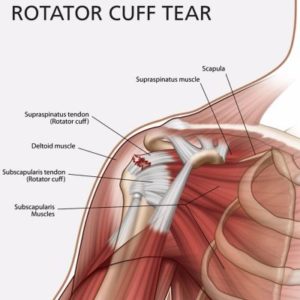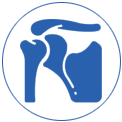Dr Gautam Tawari is an accredited orthopedic sports surgeon from The Royal College of Surgeon in the UK. He has a Diploma in Sports & Exercises Medicine (Dip.SEM) from the Royal college and is a Fellow of the Sports & Exercise Medicine Society of the UK.
He has worked as a Consultant Orthopaedic Shoulder Surgeon in the UK, Now Practicing as a Shoulder Sports Surgeon in Mumbai and specialises in advanced Shoulder joint arthroscopy & Sports related injuries to the Shoulder joint.
The common sports related injuries he routinely treats surgically include – Rotator cuff repairs, Bankart Repair and Shoulder Stabilisation surgery, SLAP repair and biceps related pain.

The rotator cuff is a group of four muscles that comes together to form a large tendon called the “cuff” which allows the shoulder to move normally. Tears of the rotator cuff disrupts shoulder balance and causes dysfunctional movement, weakness, and pain.
Cause
Tears of the rotator cuff occurs from a traumatic shoulder injury (such as a fall), or due to gradual (chronic) breakdown over time.
Presentation
The most common symptom of a rotator cuff tear is shoulder pain that is associated with weakness. The pain often radiate to the neck and upper arm, but rarely travels below the elbow. Patients often have significant pain at night and difficulty in sleeping.
Treatment
Most rotator cuff tears will progress over time and lead to worsening shoulder function and arthritis requiring surgical repair. Non-surgical treatment of a rotator cuff tear or tendon inflammation usually consists of a short period of rest, anti-inflammatory medications and a short course of physiotherapy.
Surgical management of rotator cuff injuries, is most often done through a minimally invasive (arthroscopic) technique. Arthroscopy provides a full diagnostic tour of the joint, and allows for treatment of any other abnormalities seen. The torn rotator cuff is repaired back to bone using suture anchors and varying stitching techniques.
Recovery
Full recovery (return to normal activities) can be expected by 4-6 months. Patients are required to wear a sling for 3 weeks after surgery. After the first 3 weeks, the sling is discontinued and physiotherapy is started. This progresses over 3 phases, and takes approximately 2-3 months. A gradual return to full activity is encouraged, and by six months, the shoulder is nearly back to normal except during strenuous sporting activity.
